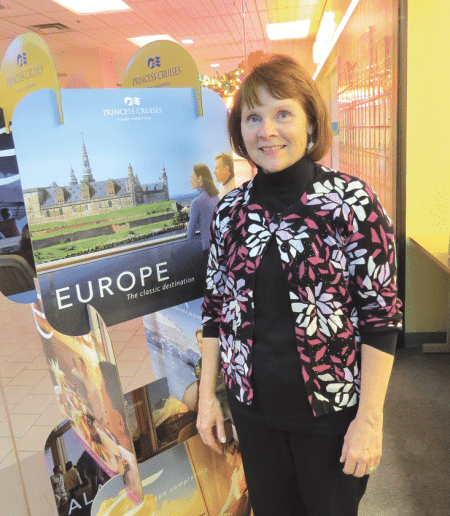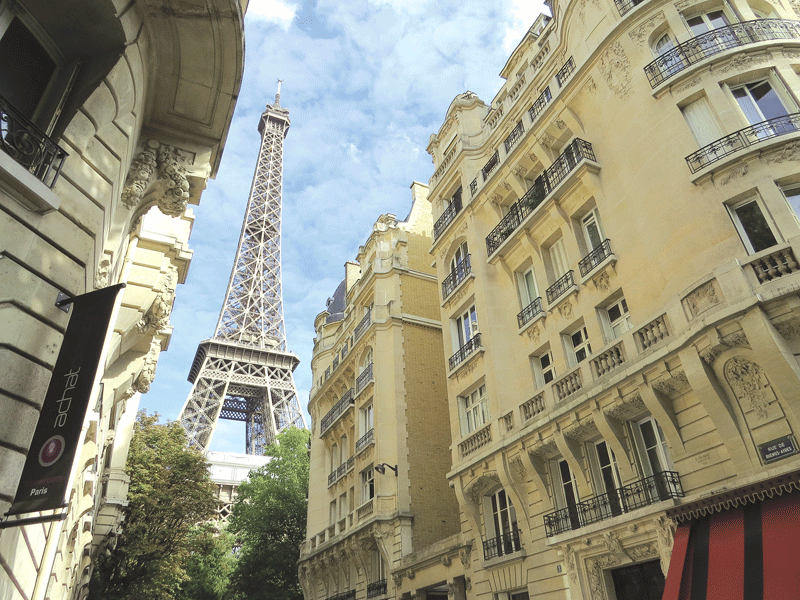Global Turmoil Isn’t Keeping Travelers from Their Destinations
Plane Speaking

Janice Webb says that the strong dollar, coupled with a desire among Baby Boomers to see the world, is the prevailing force when it comes to travel in 2016.
Janice Webb says three area couples put down their deposit for a trip to Paris for next April on the morning of Nov. 13, just hours before news of the terrorist attacks across the City of Light first broke on CNN.
Webb, owner of Emerald City Travel in Springfield, circled back with the group the next day to see if they had any questions or concerns — or intentions to change their travel plans.
They had some of the former, certainly, but none of the latter, she told BusinessWest, adding that the prevailing attitude was that, while the attacks that killed 130 people were alarming, they were not enough to prompt cancellation of a trip, which would continue with a river cruise to Amsterdam, that those involved have been looking forward to for most of their lives.
“They all e-mailed back and said, ‘let’s do this and hope for the best,’ and that appears to be the common sentiment,” said Webb, a 30-year industry veteran who noted that the various forms of turmoil in Europe are colliding head on with a potent package — a weak euro combined with a powerful desire among retiring Baby Boomers and others to get out and see the world, or at least the homes of their ancestors.
The latter is, by and large, the much stronger force at the moment.
“People want to travel, and they’re not going to let this stop them,” she said, using ‘this’ to describe the sum of the international and domestic turmoil. “They’re going to be more cautious, certainly, but they’re still going to travel.”
Paul O’Meara agreed. He’s the business development manager for the Globus family of travel brands, which includes Avalon Waterways, Cosmos, and Monograms. He told BusinessWest that, since 9/11, and even moreso in recent years, international travelers have adapted to what he called a “new norm.”
Roughly translated, this equates to expectations — for longer lines and tighter security at airports, armed soldiers at many popular tourist destinations in Europe, and, yes, possible incidents involving terrorism.
“People are more experienced now, they know what to expect, and they’re more aware of their safety and more aware of their surroundings,” he said, adding that such travelers would certainly take notice of the recent global travel alert issued by the U.S. State Department (in effect until February), but they would not be intimidated or frozen by it. “This is not 1985 or 1965; travelers are more sophisticated now, and they’ve adjusted to this new norm.”
As for the attacks in France’s capital city and their impact on travel there, he summed things up with a line he would utter more than a few times.
“Paris is Paris — there’s a reason why 30 million people go there every year,” he said, adding that his company books more visits to that city than any other except Rome. “We have about 500,000 people booked on various trips to Paris, and fewer than a dozen have cancelled.”
But an attitude of defiance when it comes to not letting terrorism get in the way of a long-planned, long-dreamed-about trip to Europe also extends to Berlin, London, Venice, Belgium (despite the fact that Brussels was locked down for several days last month), and, to a lesser extent, Istanbul, although some cruise lines and travel companies are changing some itineraries in Turkey.
“The knee-jerk reaction to what happened in Paris or in Brussels is that people aren’t going to travel there,” said O’Meara. “But that’s not what’s happening.”
For this issue and its focus on travel and tourism, BusinessWest looks at how recent events are spawning concern, but they’re not keeping travelers from reaching their destination — whatever that might be.
Cruise Control
As he talked about travel to Europe and why he doesn’t expect it to be seriously dented by the attacks in Paris and other terrorist actions in that part of the world, O’Meara started his explanation by detailing one of his company’s current offerings.
It’s a package known as ‘Italian Vista,’ and it features eight days with stops in cities like Rome, Florence, Milan, and Venice, and includes hotel stays, meals, and guided tours. The price this fall was an already-attractive $1,999, and for next year, it’s a jaw-dropping $1,449.
“That’s all due to the weak euro and the attractive exchange rates,” he told BusinessWest, adding that such sticker prices on trips across the continent help explain why bookings for 2016 are running roughly 13% ahead of the pace for last year, despite the attacks in Paris, the bomb that brought down a Russian airliner, the refugee crisis, and other forms of turmoil.
“This is the time to book, and people are doing it,” he said. “The prices are attractive, the dollar is strong … these are great opportunities, and people don’t want to miss out on them.”

The terrorist attacks in Paris were unnerving, but thus far, they do not appear to be a deterrent for those making plans to visit the City of Light.
That’s not to say that the terrorist attacks in Paris are not having an impact in that city or others. Indeed, the general manager of the Palace Hotel Park Hyatt Paris-Vendome and Park Hyatt’s vice president for France recently told The New York Times, “Naturally, occupancy is drastically decreasing in the wake of the attacks … we noticed a lot of cancellations right after the attacks for the following days and weeks, with the decrease more significant on bookings from the leisure traveler segment than the business one.”
But overall, O’Meara says travelers are simply pausing before traveling to Paris and other destinations, and the sentiment within the travel industry is that they won’t be pausing for long, unless there are more incidents.
Webb agreed. She said fall is the time when travel companies put out deals designed to fill cruise ships and hotels for the coming season, and thus far, travelers have not been shy about snapping them up.
“They offer these deals, which include airfare sales, percentage discounts, and past-passenger discounts, to get the product rolling,” she said, adding that these discounts are typical of what’s been offered the past several years. “And I’ve had a lot of people make reservations starting the first week in October; it’s been steady since, and it’s mostly European product.”
She said there are many factors at play when it comes to the ongoing surge in international travel — and travel in general. They include the strong dollar, which is now worth almost as much as a euro, when three years ago the rate was almost 1.4 dollars to the euro.
But there’s more to the equation. Bad winters, especially the one in 2015, have promoted many to conclude that, to endure such punishment, they need to break it up with a week or 10 days someplace warm, usually coinciding with February school vacation.
Adventure-packed destinations are still very much in vogue, which means Costa Rica is still hot, said Webb, adding quickly that many people young and old have already been there and done that, and now, most are just looking for a good deal and a good beach.
Then there are the aging Baby Boomers, many of them with disposable income, and others as well, who want to visit places they’ve heard about or the country their family calls home.
For many in this region, that means Italy or Ireland. “It seems like there’s lots of Irish and Italians in the Springfield area,” said Webb, who is booking lots of trips to both countries.
But there is still another factor in all this, she went on, noting that, overall, events like those that took place in Paris have only a temporary impact on travel — if other conditions are favorable, such as the economy — and usually not a deep impact.
An exception to that rule was 9/11, Webb added quickly, noting that the industry suffered greatly as business was frozen by uncertainty. But even then, there were groups and individuals who were undaunted and determined to seize opportunities.
“People were generally fearful at first,” she said of the days and weeks following 9/11. “But there’s one contingent of people who travel right away because they know the prices are going to be low, and they’re going to book the bargains. And then, a second contingent of people come right behind them, because they’re just tired of not doing what they want to do, and at that point, they perceive the risk to be worth taking to see what they want to see or live the way they want to live.”
Whether this pattern continues in the wake of this tumultuous fall remains to be seen, but all indications are that it will.
But while travelers will be undaunted, for the most part, they will also be more cautious, Webb predicted. She predicted that some may opt to travel with a group rather than visiting a city or region on their own, which is good for cruise-ship lines and tour operators.
Meanwhile, others may seek out destinations deemed to be safe, or at least safer.
“Sometimes a travel warning like this will push people to cruising,” Webb explained, “because if a port is deemed unsafe, the cruise line won’t go there; they’ll just substitute another port, and so people feel confident that, if the cruise lines go there, it’s a safe place to go.”
Not Tripped Up
Even within the confines of that ‘new norm’ O’Meara described, the terrorist attacks in Paris were certainly unsettling — for travelers and the travel industry.
Thus far, though, it appears that the package of attractive fares, a strong dollar, a desire among Boomers to see the world, and ‘Paris being Paris’ is creating opportunities well worth the sum of the risks involved.
Like those three local couples bound for Paris next spring, people are booking, and hoping for the best.
George O’Brien can be reached at [email protected]




